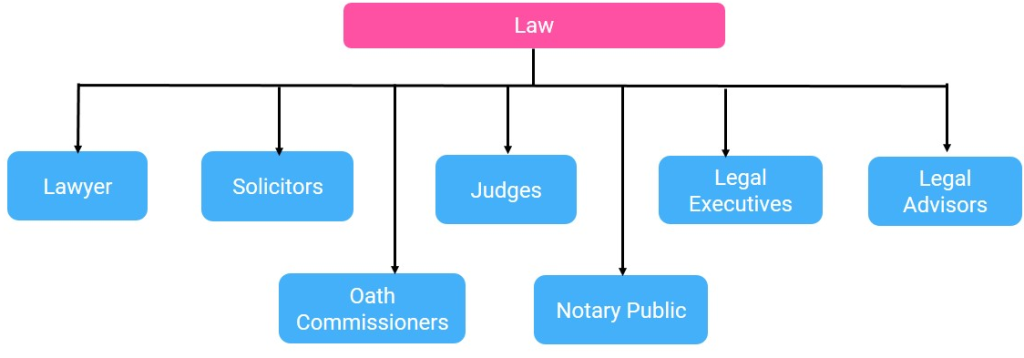

Law is a career stream that candidates pursue at undergraduate (UG), postgraduate (PG) or doctorate (PhD) level to practice the legal profession in India. Law as a career is very popular among students in India. The popularity of this stream can be judged from the fact that famous people like Mahatma Gandhi, Nelson Mandela as well as the former US President Barack Obama were lawyers.
Scope of law as a career is immense in India. These days, law graduates do not just opt to get dressed in black and white apparels and head to court but also make their presence feel in corporate houses, law firms, law agencies, administrative services and the likes.
| Course | Eligibility | Duration |
|---|---|---|
| Diploma and Certificate Courses | Graduation | 1 year |
| B.A in LLB | Class 12(any stream) | 3years |
| M.A in LLB | Graduation in LLB | 2 years |
| PhD / Doctorate Course | M.A | 3-5 years |
Common Law Admission Test (CLAT)
Law School Admission Test – India (LSAT India)
All India Law Entrance Test (AILET)
Depending on the type of institute/quota/degree, fees can range from INR 5 thousand to INR 3 lakhs per year, excluding lodging and boarding.
Convincing skills
Confidence
Good presentation skills
Ability to assimilate as well as analyze facts
Strong command over the language
Good judgment of situation/people
The following are the opportunities available for lawyers in various fields:

Lawyer: In this job profile aspirants are also sometimes referred to as advocates. A lawyer mostly represents one of the parties/ clients in a trial at court. As part of this job profile, one needs to cross examine witnesses and then list reasons/ facts around why the court should give the judgment in favor of their clients.
Oath Commissioners: Anyone who works under this job profile is authorized to verify affidavits. An Oath Commissioner is appointed by the Chief Justice and is usually (though not always) a solicitor. The functions of an Oath Commissioner are as follows:
Solicitors: Solicitors give legal advice and represent their client in legal matters. Solicitors mostly work for firms which take up cases related to their area of work.
Judges: As a Judge one has to ensure that justice is administered and legal rights of all the involved parties are safeguarded. A Judge presides over trials/hearings wherein s/he has to listen to the case presented by lawyers.
Legal Executives: People opting to work for such a job profile typically advise their employers on legal matters. They also work on litigation cases for their firm. They also perform administrative functions along with handling in-house legal problems such as checking deeds, issuing writs, collecting information for affidavits as well as draft legal documents. Legal executives also represent their business house when they discuss legal issues with other firms.
Legal Advisors: In this job profile, one is expected to counsel clients on legal rights and obligations. Legal advisors mostly research laws applicable to a particular case and thereafter go through previous judgments passed in cases similar to the one their client is currently facing and thereafter help them in listing out how they can defend themselves.
Notary Public: Notaries are appointed by the central government for the whole or specific part of the country. The various State governments also appoint notaries who work for the whole or a specific part of the state. Any person who has been practicing Law (as a lawyer) for minimum ten years is eligible to apply for a notary post. As per the Notaries Act 1952, the function of a Notary is as follows:
Bachelor of Arts & Bachelor of Legislative of Law
Bachelor of Law in Intellectual Property Rights
Cooperate and security Law
Criminal Law
Energy Laws
Labour Law
Criminal Justice
Intellectual Property Rights
Anti-Terrorism Laws
Gujarat National law university, Gandhinagar (https://www.gnlu.ac.in)
Institute of Law, Nirma university.Ahemdabad (https://law.nirmauni.ac.in)
Parul University, Vadodara (https://www.paruluniversity.ac.in)
University school of Law, Ahemdabad (http://www.gujaratuniversity.org.in)
Maharaja Sayajirao University of Vadodara, Vadodara (https://www.msubaroda.ac.in)
Symbiosis Law School, Pune (https://www.symlaw.ac.in)
ILS Law School, Pune (https://ilslaw.edu)
Bharthiya Vidhyapeeth new Law College (https://bvuniversity.edu.in)
Government Law College, Mumbai (http://www.glcmumbai.com)
Mumbai University, Mumbai (https://old.mu.ac.in)
National law school of India university, Bangalore (https://www.nls.ac.in)
National Law university, Delhi (https://nludelhi.ac.in)
NALSAR University of Law (https://www.nalsar.ac.in)
Symbiosis Law School, Pune (https://www.symlaw.ac.in)
Mumbai University, Mumbai (https://old.mu.ac.in)
Khaitan & Co.
AZB and Partners
J.Sagar Associates
Shardul Amarchand Mangaldas & Co.
Phoenix Legal
Note:
All the students, teachers and guardians should note that the above mentioned websites and information on various colleges/universities may change under the rules and regulations of the education department.